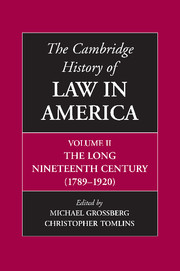Book contents
- Frontmatter
- 1 Law and the American State, from the Revolution to the Civil War: Institutional Growth and Structural Change
- 2 Legal Education and Legal Thought, 1790–1920
- 3 The Legal Profession: From the Revolution to the Civil War
- 4 The Courts, 1790–1920
- 5 Criminal Justice in the United States, 1790–1920: A Government of Laws or Men?
- 6 Citizenship And Immigration Law, 1800–1924: Resolutions Of Membership And Territory
- 7 Federal Policy, Western Movement, and Consequences for Indigenous People, 1790–1920
- 8 Marriage and Domestic Relations
- 9 Slavery, Anti-Slavery, and the Coming of the Civil War
- 10 The Civil War And Reconstruction
- 11 Law, Personhood, and Citizenship in the Long Nineteenth Century: the Borders of Belonging
- 12 Law in Popular Culture, 1790–1920: The People and the Law
- 13 Law and Religion, 1790–1920
- 14 Legal Innovation and Market Capitalism, 1790–1920
- 15 Innovations in Law and Technology, 1790–1920
- 16 The Laws of Industrial Organization, 1870–1920
- 17 The Military in American Legal History
- 18 The United States and International Affairs, 1789–1919
- 19 Politics, State-Building, and the Courts, 1870–1920
- Bibliographic Essays
- Notes on Contributors
- Index
- References
6 - Citizenship And Immigration Law, 1800–1924: Resolutions Of Membership And Territory
Published online by Cambridge University Press: 28 November 2008
- Frontmatter
- 1 Law and the American State, from the Revolution to the Civil War: Institutional Growth and Structural Change
- 2 Legal Education and Legal Thought, 1790–1920
- 3 The Legal Profession: From the Revolution to the Civil War
- 4 The Courts, 1790–1920
- 5 Criminal Justice in the United States, 1790–1920: A Government of Laws or Men?
- 6 Citizenship And Immigration Law, 1800–1924: Resolutions Of Membership And Territory
- 7 Federal Policy, Western Movement, and Consequences for Indigenous People, 1790–1920
- 8 Marriage and Domestic Relations
- 9 Slavery, Anti-Slavery, and the Coming of the Civil War
- 10 The Civil War And Reconstruction
- 11 Law, Personhood, and Citizenship in the Long Nineteenth Century: the Borders of Belonging
- 12 Law in Popular Culture, 1790–1920: The People and the Law
- 13 Law and Religion, 1790–1920
- 14 Legal Innovation and Market Capitalism, 1790–1920
- 15 Innovations in Law and Technology, 1790–1920
- 16 The Laws of Industrial Organization, 1870–1920
- 17 The Military in American Legal History
- 18 The United States and International Affairs, 1789–1919
- 19 Politics, State-Building, and the Courts, 1870–1920
- Bibliographic Essays
- Notes on Contributors
- Index
- References
Summary
The paradigmatic function of a national immigration regime is to defend a territorial inside from a territorial outside. Access to and presence within this territorial inside are determined on the basis of whether one is a “citizen” or an “alien,” where both terms are understood in their formal legal sense. All of the activities we associate with the contemporary U.S. immigration regime – exclusion and deportation, entry checkpoints, border patrols, detention centers, and the like – make sense in these terms.
Liberal American theorists have provided powerful moral justifications for this defense of the territorial inside from the territorial outside on the ground that it is only in this way that the coherence of a national community on the inside can be preserved and fostered. In this rendering, the coherence of the national community may not take the form of an oppressive Blut und Boden nationalism. Rather, the territorial inside must be a homogeneous space of rights enjoyed by all insiders. Although most of these insiders will be citizens, resident immigrants will be treated fairly and given a reasonable opportunity to become citizens. The very coherence of the territorial inside as a homogeneous space of rights justifies immigration restriction. Outsiders – who are imagined as citizens of other countries – have no morally binding claim to be admitted to the inside.
This theoretical rendering of the activities of the national immigration regime is the product of recent history. For the first century of the United States’ existence as a nation (from the American Revolution until the 1870s), a national immigration regime that regulated individuals’ access to, and presence within, national territory on the basis of their national citizenship simply did not exist.
- Type
- Chapter
- Information
- The Cambridge History of Law in America , pp. 168 - 203Publisher: Cambridge University PressPrint publication year: 2008
References
- 3
- Cited by



